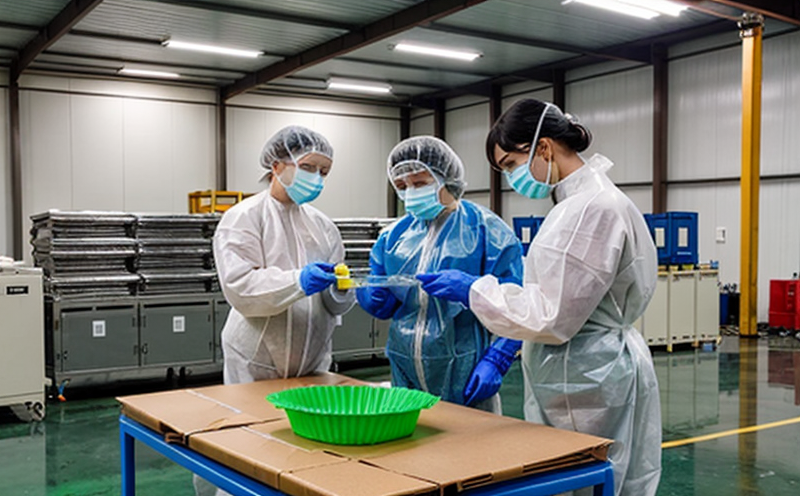ASTM D790 Flexural Testing of Plastics Limit of Detection and Quantitation Assessment Test
The ASTM D790 test method is a widely recognized standard used for determining the flexural properties of plastics. In particular, this service focuses on assessing the Limit of Detection (LOD) and Quantitation (LOQ) in plastic materials using ASTM D790 flexural testing. This service is crucial for quality managers, compliance officers, R&D engineers, and procurement professionals who need to ensure that their plastic packaging meets stringent performance criteria.
The flexural test measures the ability of a material to resist bending before it breaks or deforms permanently. The flexural modulus (also known as Young's modulus) is an important indicator of a plastic’s stiffness. This service aims at quantifying these properties accurately, especially when dealing with very thin or low-density plastics where traditional methods may not be sensitive enough.
The ASTM D790 test involves subjecting rectangular specimens to gradually increasing loads until they break. The flexural strength and modulus are calculated based on the load-deflection data collected during this process. To achieve precise results, it is essential to prepare specimens correctly according to the standard’s specifications.
For plastics with low concentrations of additives or fillers, traditional testing methods might struggle to detect subtle differences in performance. This service uses advanced techniques and instrumentation to push the limits of detection for these materials. By employing more sensitive equipment and refined sample preparation procedures, we can provide accurate measurements even when dealing with very small quantities.
One key aspect of this service is its ability to assess both the lower limit (LOD) where a change in material property can be detected and the upper limit (LOQ) at which reliable quantification becomes possible. Understanding these limits helps manufacturers optimize their formulations without compromising on quality or regulatory compliance.
The precision required for flexural testing of plastics is critical, especially when dealing with complex composite materials. Our laboratory uses state-of-the-art instruments such as universal testing machines equipped with high-resolution sensors capable of capturing minute changes in deflection. This allows us to generate detailed stress-strain curves essential for accurate property determination.
Compliance with international standards ensures that our findings are internationally recognized and accepted. We adhere strictly to ASTM D790, ensuring consistent results across different batches or suppliers. Additionally, we can provide comparative studies if needed, helping clients understand how their materials perform relative to industry benchmarks.
Scope and Methodology
The scope of this service covers the flexural testing of plastics aimed at assessing the Limit of Detection (LOD) and Quantitation (LOQ). The methodology involves preparing rectangular specimens according to ASTM D790 guidelines, then subjecting them to gradually increasing loads until failure occurs. Key parameters measured include flexural strength, flexural modulus, and the point at which the material starts to deform permanently.
The testing process typically begins with selecting appropriate test samples based on the desired outcome. These could range from simple single-layer films to multi-layered structures depending on the application being evaluated. Once chosen, each sample is carefully prepared following ASTM D790 specifications which dictate precise dimensions and surface finishes necessary for accurate measurement.
The testing itself takes place on a universal testing machine capable of applying controlled loads while simultaneously measuring deflections. High-resolution cameras ensure that every movement during loading can be captured accurately. Data collected includes not only the maximum load applied before failure but also intermediate points where significant deformation occurs, allowing for comprehensive analysis of the material’s behavior under stress.
After completing all tests on a given set of samples, detailed reports are generated summarizing key findings along with raw data if requested by the client. These reports serve as valuable tools not only for internal quality assurance purposes but also for demonstrating compliance with relevant regulations and standards to external stakeholders such as regulatory bodies or customers.
Benefits
By utilizing this specialized ASTM D790 flexural testing service, clients gain several advantages:
- Precision measurement of flexural properties even for very low-density plastics.
- A clear understanding of the exact limits where changes in material performance can be detected and quantified.
- Compliance with international standards ensuring consistency across batches or suppliers.
- Accurate comparison against industry benchmarks if required, providing valuable insights into relative performance.
The ability to precisely characterize plastic materials is particularly beneficial in industries where even slight variations can impact product functionality or regulatory compliance. For instance, pharmaceutical packaging must meet strict specifications regarding rigidity and durability; any deviation could lead to potential safety issues during transportation or storage. Similarly, food contact packaging requires careful attention to barrier properties to prevent contamination.
With this service, manufacturers can ensure that their plastic products consistently meet required standards while minimizing waste by optimizing formulations just above the LOD. This leads to cost savings through improved efficiency and reduced need for rework due to non-compliance issues.
Industry Applications
| Industry Sector | Common Use Cases |
|---|---|
| Pharmaceuticals | Ensuring proper rigidity and durability of packaging to safeguard medication during transport. |
| Food & Beverage | Guaranteeing barrier properties in containers to protect contents from contamination or spoilage. |
| Consumer Goods | Developing robust yet lightweight packaging solutions for products like cosmetics or electronics. |
- Automotive – Evaluating fuel line connections and other components requiring precise flexural strength.
- Machinery – Assessing the integrity of gears, shafts, and other mechanical parts subjected to bending forces.
- Construction Materials – Testing concrete additives or fiber reinforcement for improved structural performance.
The application range extends beyond these sectors into any industry where plastic materials play a critical role in product design. By providing accurate flexural property data, this service supports innovation by helping developers refine their materials continuously based on real-world performance metrics.





